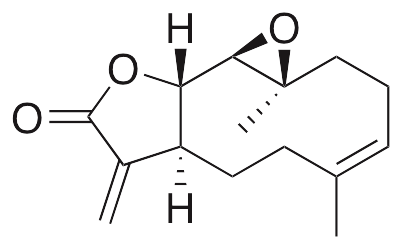Description
Parthenolide is a sesquiterpene lactone found in Tanacetum that exhibits anticancer chemotherapeutic, anti-metastatic, anti-angiogenic, anti-inflammatory, and antinociceptive activities. Parthenolide acts as a partial agonist at transient receptor potential ankyrin 1 (TRPA1) channels and desensitizes them, preventing release of calcitonin gene-related peptide (CGRP). Additionally, parthenolide inhibits ATPase activity of NLRP3 and protease activity of caspase 1. In multiple myeloma cells, parthenolide decreases expression of NF-κB, VEGF, and IL-6 and increases expression of IκB kinase, inhibiting cell migration and tubule formation. In non-small cell lung cancer (NSCLC) cells, parthenolide decreases levels of MCL-1 and increases levels of MAIP-1, triggering ER stress and inducing cell cycle arrest and apoptosis. In breast cancer cells, this compound activates NADPH oxidase and increases ROS generation, increasing levels of p-JNK and downregulating NF-κB, VEGF, and matrix metalloproteinases 2 and 9 (MMP2/9); in vivo, parthenolide inhibits tumor growth and metastasis.
